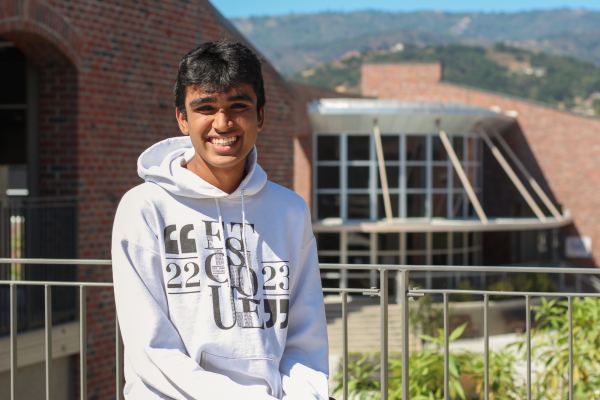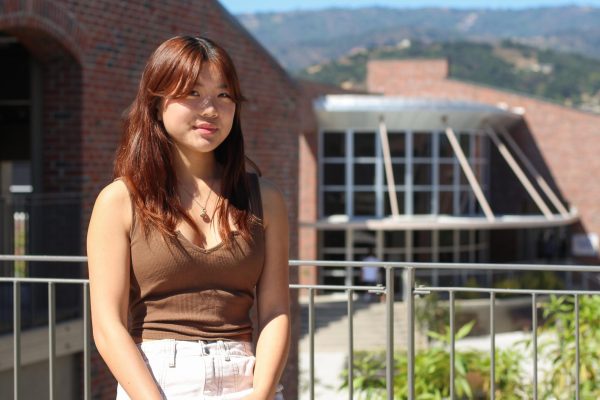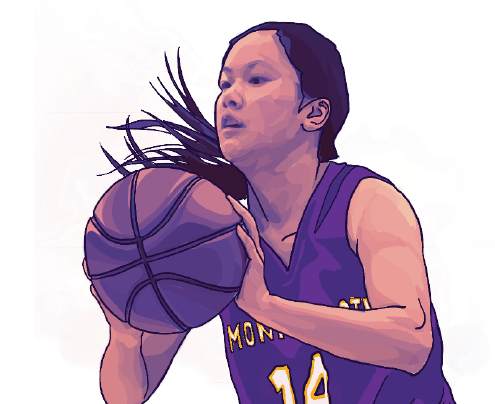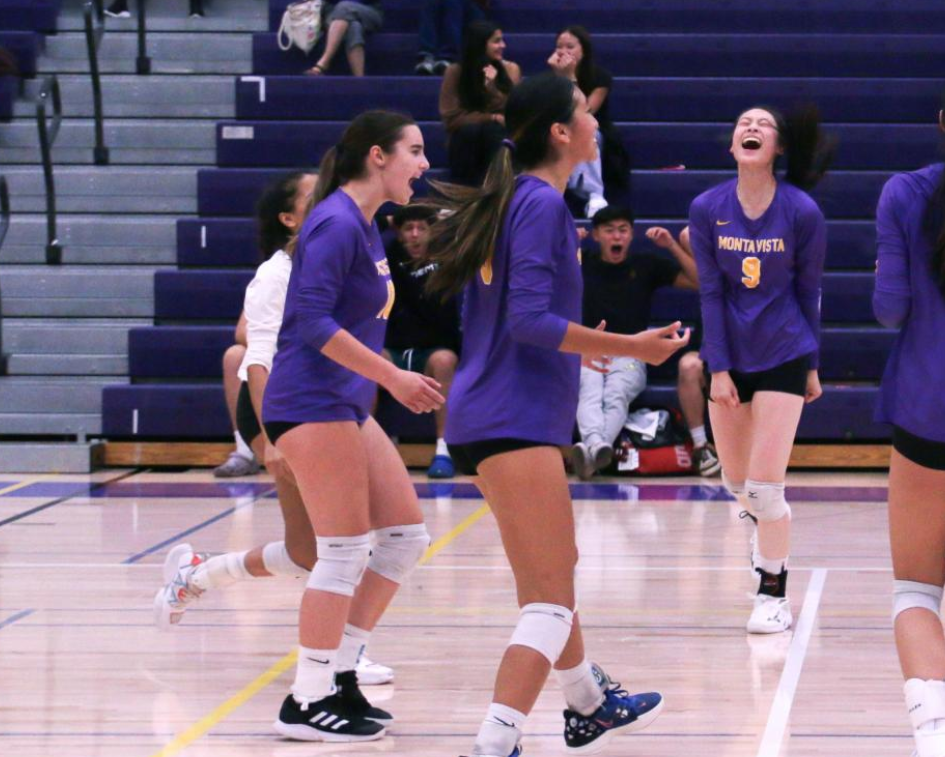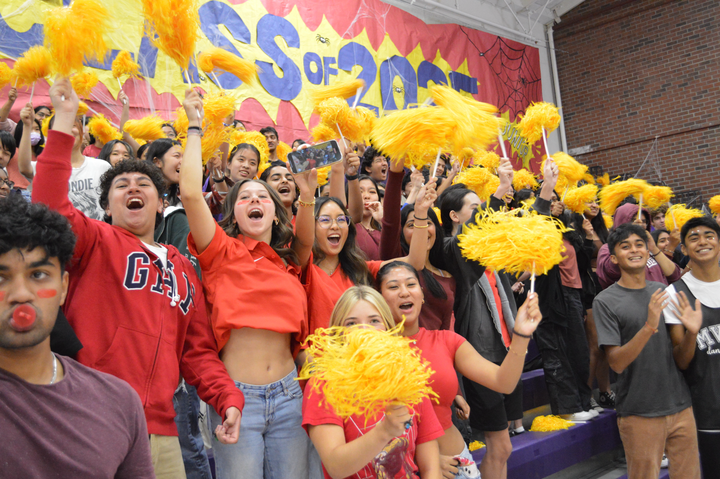AD: Hi everyone, my name is Arjun Dhruv.
LJ: And I’m Lily Jiang.
AD: Welcome to Episode 19 of Time Out! Each episode, we dive into the sports scene here at Monta Vista and explore the journeys of athletes from various sports. In this episode, we are joined by junior Anisha Pant who shares her journey in fencing.
AD: When did you start fencing?
AP: I started fencing when I was seven or eight years old.
AD: And why did you decide to pick up such a niche sport?
AP: When my dad was younger, he found it very interesting. So he wanted to put me into it because of that.
AD: Does your dad play a big role in your fencing career?
AP: Yeah, he always travels with me to tournaments and drops me off and picks me up from class.
AD: What are some of the tournaments you’ve participated in and traveled to?
AP: Internationally, I’ve been to Paris and Poland. For Poland, my club was invited to something, it was like a camp. And then at the end of the camp, there was a tournament, and then in France, it’s called the Marathon Fleurette. It happens in February, and it is an international tournament for fencers under the age of 14, and there I placed 11th. Nationally, I’ve been to National Championships which happen throughout the U.S. and Junior Olympics.
AD: What is your experience at these tournaments with your club? Does the whole club travel?
AP: It’s a very individual sport. So you do train with your club, but everything else is kind of done on your own. So you travel with your family, and then you compete because everyone competes in different age groups in different categories.
LJ: Even though it is more of an individual thing, are there any ways your team supports you?
AP: Yeah, throughout tournaments, they always come in to cheer me on and inside the club, we always practice together and train together and I’ve helped my coach with a lot of different things.
AD: Do your other sports and activities affect your performance in fencing and how do you balance all those things?
AP: I had to do golf team at the beginning of this year. It kind of did interfere with my practice because I would have to go to golf practice right after school and then have fencing right after so during that time, I didn’t go to fencing practice as much, but besides that, it’s not too bad.
LJ: How often do you usually go to fencing practice?
AP: It’s usually three or four times a week and then if school is bad, then two to three times.
AD: So what goals do you have in fencing in your future?
AP: I hope to use it to get into college, and then continue with it throughout college.
AD: Are you currently trying to get recruited?
AP: Yes.
AD: What’s that process like?
AP: You just introduce yourself, so you send out emails to every college that you’re kind of interested in, and you give them information about yourself and then a little video of you fencing like a five-touch bout or something, and then they’ll respond to you or you can keep bugging them until they do respond and then you kind of work with the coach and they decide whether they want to recruit you based on your grades and everything as well.
AD: So what is your favorite and least favorite part of the sport?
AP: My favorite part is probably traveling because I get to go to a lot of different places. And then my least favorite is just probably time commitment because it’s year-round. So I’m always practicing.
LJ: What are some of your favorite memories that you have?
AP: The Paris tournament was really big for me because I have family there too. So I was there for over two weeks. And we had a camp at the beginning before the tournament where I met a lot of different people from many different countries like China, Hungary, all of them and I became close with them as well. So I like branching out and meeting so many new people.
LJ: When was the tournament?
AP: Right before COVID, so I think seventh grade.
AD: How did COVID affect your fencing career? Did it slow down your recruitment?
AP: It was before high school so it wasn’t too bad. But during that entire first six months or something I had no practice at all. And practice was literally just staying at home and doing exercises at home. So when I came back, it took me a while to get back into the groove. So it did stunt my growth I think a little.
AD: How has your fencing been going this year and how have you been doing in tournaments?
AP: I haven’t been training as much as I should be because of school and everything. So I wasn’t performing as well as I was in ninth and 10th grade but it’s OK.
AD: Are there lots of requirements and pressure to train a lot?
AP: Yeah. I wouldn’t say pressure. It’s kind of by this age, it’s kind of just based on whether you want to do it or not, so it’s whether I’m willing to stay up late and study. But it’s kind of up to me — it’s not like my coach pushes anything on me or my parents either, it’s kind of just whether I want to perform well or not.
AD: What role do you think your coaches and your parents, all the adults in your life played in your fencing career?
AP: I think all they need to do is just support me and help fund my traveling. Because I feel like if I want something I should get it for myself and not rely on their pressure or anything.
AD: Can you tell us when you go to a tournament what the whole process is like?
AP: The most recent tournament I went to was Junior Olympics, which was in February and so there, usually the thing is when you travel so far away, you compete in more than one age category. So I did cadets and juniors, which means under 19 and under 21 or something like that. One tournament only takes up one day, but they’re kind of separated so when there is a tournament that day, you’re put into pools based on how good your previous rankings have been. Then in that pool, you do five touch bouts, versus five or six people and then based on how good you do on that. Then you’re placed in a tableau and then best fencer fences worst all the way until the end. So each event is a day long.
AD: Are there different events you participate in?
AP: Just age groups, but usually people tend to only do one weapon, but I do two. So I do foil and épée. So that just is different based on target area and right of way. So in that case, I have to be able to keep switching between weapons and switching between my methods of fencing. But the organization of the tournament is still the same.
AD: When you get recruited do you have a ranking, how does that work?
AP: You have to compete in tournaments in college to get into the NCAA and then once you do get into the NCAA, then you compete with other people in the NCAA. But you don’t have to, you kind of go in as a no-name and then you have to build yourself up again in college.
LJ: Do you think it is something you could take past college?
AP: I think I could but I’d have to be really really good, because once you are past college it is only the top four people who compete for the U.S. and internationally and Olympic-level people. In my age group, there are a lot of really good people already, so I don’t think I’m going to take it too much further past college.
AD: What’s it like playing a sport that not many people play, like we don’t have a team here right? What’s it like playing such a unique sport?
AP: Whenever I find someone from a school close by in our district or something you always just like automatically get closer to them because you bond over something. But I feel like playing a unique sport differentiates you from other people, which I guess could be good or bad, but everyone knows you as the person who fences.
LJ: Have you met any other people at Monta Vista that also do fencing?
AP: I know people who went to Kennedy who did fence but then they didn’t go to Monta Vista, they went somewhere else after that. But in Monta Vista, I don’t think anyone.
AD: Do you think fencing helps you make friendships and connections?
AP: Yeah, I do because when I travel I get to meet people who I’m friends with on the East Coast who I rarely ever see. When people move to places and they continue fencing, you get to meet them when you see them at other tournaments.
AD: Can you tell us a little bit about the team you’re part of and the club and the organization?
AP: So my club’s name is Maximum Fencing Club. My coach opened it up a few years ago. So I’ve been one of the older people who was in the club, versus my previous club, which has been there for like 20 years. When he did first open it I was one of the older people there so he needed help with maintaining the club. So I did help him run classes for younger fencers. And I worked with him sometimes if he needed help with fixing blades and stuff like that. But as new people came in I didn’t have to do as much as he built his club up, but now I’m still really close with him and all the other fencers there.
AD: Does your club help you find tournaments and get recruited or is that something you have to do on your own?
AP: Recruiting-wise, they can give me letters of rec and analyze my transcript. But finding tournaments, it’s publicized by USA Fencing so I can just follow that.
AD: That’s all for Episode 19 of Time Out! Thank you to Anisha for joining us, and we’ll see you guys next time!
Music Credits: Fashion – Alex Productions


















